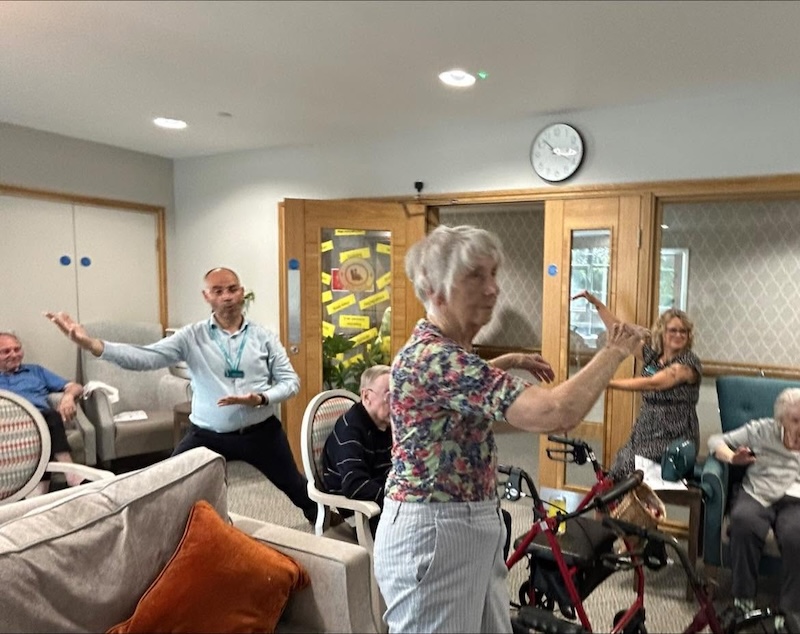Finding the Right Care for Your Loved One in Oxfordshire

As a care home manager here in Oxfordshire, I understand the challenges families face when considering care options for a loved one. It's a deeply personal decision, often made during a difficult and emotional time.
This article aims to provide some guidance and resources to help you navigate this process and find the right care solution for your loved one.
Understanding Your Loved One's Needs:
The very first step in navigating the path towards suitable care for your loved one is understanding their specific needs and preferences. This crucial information helps you identify the care option that best supports their well-being and independence. Here's how to approach this step:
1. Assess their level of independence
Can your loved one safely complete daily tasks like bathing, dressing, and preparing meals? For instance, if your father has recently experienced a stroke that affects his mobility, he might require assistance with bathing and dressing but may still be able to enjoy preparing simple meals.
2. Evaluate their physical and cognitive abilities
Consider their physical limitations, such as difficulty walking or managing stairs. Think about their cognitive function as well. Does your mother experience memory lapses or confusion? For example, if your mother has early-stage dementia, she might benefit from a care home with memory boxes and familiar routines to promote cognitive stimulation.
3. Identify any ongoing health conditions
Does your loved one have diabetes, heart disease, or other chronic health concerns? Understanding these conditions is essential to ensure the chosen care home can provide the necessary medical support. For instance, if your grandfather requires regular blood sugar monitoring and medication management for his diabetes, a care home with qualified nurses on staff would be crucial.
4. Explore their daily routines and preferences
What are their hobbies and social interests? Knowing their preferences for reading, gardening, or spending time with others helps you find a care home that offers activities they enjoy. For example, if your grandmother thrives on social interaction and loves board games, a care home with regular bingo nights and group activities might be a good fit.

Open Communication is Key
Open communication with your loved one, their doctor, and other healthcare professionals is vital for gathering this information. Have honest conversations with your loved one about their needs and preferences. While it may be a sensitive topic, their input is crucial in making informed decisions.
Consulting with their doctor can provide valuable insights into their medical needs and any limitations they may have. Additionally, therapists or other healthcare professionals involved in their care can offer valuable perspectives on their emotional and social needs. By gathering a comprehensive picture of your loved one's situation, you'll be well-equipped to find the care option that best supports their well-being and dignity.
Exploring Care Options in Oxfordshire
When considering care options for your loved one, understanding the different types of care homes available is crucial. Here's a closer look at the key distinctions between residential care, nursing homes, and dementia care homes:
Residential Care Homes
These homes offer a comfortable and supportive environment for individuals who need some assistance with daily living activities but still retain a degree of independence. Residents in residential care homes may require help with tasks like bathing, dressing, medication management, or meal preparation. However, they typically maintain some level of autonomy in their daily routines. Residential care homes often provide social activities, communal dining spaces, and housekeeping services, ensuring a sense of community and well-being.
A good example of a suitable candidate for residential care might be an older adult who experiences some mobility issues but can still walk with a cane. They might require assistance with showering but enjoy preparing their own breakfast. In a residential care setting, they can receive the support they need with daily tasks while still maintaining a sense of independence and participating in activities they enjoy.
Nursing Homes
Nursing homes in Didcot cater to individuals with more complex medical needs that require 24/7 care and support. These homes are staffed with registered nurses and other healthcare professionals who can provide medication management, wound care, assistance with mobility, and other medical services. Nursing homes are often equipped to manage chronic health conditions such as diabetes, heart disease, or respiratory illnesses. They may also offer physical and occupational therapy services to promote residents' continued well-being.
For instance, if your loved one has recently suffered a stroke and requires ongoing physical therapy to regain mobility, a nursing home would be a suitable option. The qualified medical staff can provide the necessary care and support to aid their recovery while ensuring their other needs are met.
Dementia Care Homes
These specialised care homes cater specifically to individuals living with dementia. Dementia care homes in Didcot provide a safe and secure environment that minimises wandering risks and promotes cognitive stimulation. The staff in these homes receive specialised training to understand the unique challenges associated with dementia, such as memory loss, confusion, and behavioural changes. They employ compassionate care approaches and create structured routines to help residents feel secure and maintain a sense of well-being. Dementia care homes often offer activities specifically designed to stimulate cognitive function and social interaction.
Imagine a situation where your loved one has been diagnosed with Alzheimer's disease and experiences increasing forgetfulness and confusion. A dementia care home would be well-equipped to manage their condition. The secure environment, specially trained staff, and stimulating activities can provide the support they need while promoting their emotional and cognitive well-being.

Valerian Court Care Home: A Personalised Approach to Care
At Valerian Court Care Home, we are committed to providing exceptional care for our residents in Oxfordshire. We offer a range of care options, including residential, nursing, and dementia care. More importantly, we believe in a person-centred approach, tailoring care plans to each resident's individual needs, preferences, and stage of life.
Key Considerations When Choosing a Care Home:
Once you have a clearer understanding of your loved one's needs and the various care options available, it's time to start researching specific care homes. Here's how to approach visiting and evaluating potential care facilities:
Location, Location, Location: Consider how convenient the care home's location is for you and other family members. Regular visits are crucial for maintaining a strong connection with your loved one. If the care home is too far away, frequent visits might become challenging. Finding a facility within a reasonable distance allows you to be more involved in their care and provide emotional support.
A Home Away From Home: When touring the care home, pay attention to the living spaces. Are the rooms comfortable and well-maintained? Is there sufficient natural light and ventilation? Look for communal areas that encourage interaction and socialisation. Does the care home offer amenities that cater to your loved one's interests, such as a library, gardening space, or a games room? A comfortable and stimulating environment can significantly enhance their well-being.
The Heart of the Care Home, The Staff: The staff plays a vital role in your loved one's experience. During your visit, observe the staff's interactions with residents. Do they appear kind, compassionate, and patient? Are they attentive to residents' needs and respectful in their communication? Inquire about staff qualifications and training, particularly for specialised care homes like dementia care facilities. A well-trained and caring staff team is essential for providing exceptional care.
Engaging Activities Promote Well-being: Ask about the activities program offered by the care home. Does it cater to a variety of interests and abilities? Are there activities that promote cognitive stimulation, physical activity, and social interaction? Engaging in activities can help residents maintain a sense of purpose, improve their mood, and combat boredom. Look for a program that aligns with your loved one's preferences and supports their overall well-being.
Understanding the Costs: Care homes have different fee structures. Before making a final decision, be sure to understand the associated costs. Ask about all-inclusive fees, any additional charges, and potential financial assistance programs that might be available. Some local authorities or charities may offer financial support for care home placements. Having a clear understanding of the financial implications allows you to make informed decisions that align with your budget.
By scheduling visits and carefully evaluating these key aspects, you can gain valuable insights into the care homes under consideration. Remember, this is an important choice, so take your time, ask questions, and don't hesitate to visit multiple facilities before making a final decision.

Finding Support and Resources, We're Here to Help
At Valerian Court Care Home, we understand the importance of finding the right care solution for your loved one. We encourage you to contact us to discuss your needs and arrange a visit to our care home. Our team is here to answer your questions and provide you with the information and support you need during this important decision-making process.






